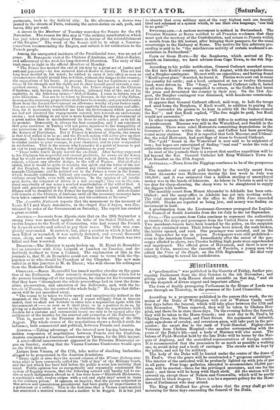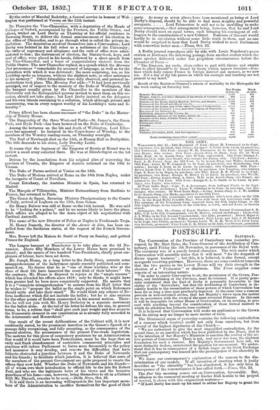311iste1utruno.
A "proclamation" was published in the Gazette of Friday, further pro- roguing Parliament from the 21st October to the 4th November ; and giving order that both Houses should assemble on that day, " and sit for the despatch of divers urgent and important affairs."
The form of finally proroguing Parliament in the House of Lords was gone through on Thursday, in the presence of the Lord Chancellor.
According to a programme published in the papers this week, the re- mains of the Duke of Wellington will rest at Walmer Castle until four days before the funeral, which will take place between the 17th and 19th November. When removed, they will be taken to Chelsea Hos- pital, and there lie in state three days. On the evening before the funeral, they will be taken to the Horse Guards ; and next day to St. Paul's, by Charing Cross, the Strand, and Fleet Street. Six regiments of infantry, eight squadrons of cavalry, and seventeen guns, will take part in the pro- cession ; the escort due to the rank of Field-Marshal. Eighty-three Veterans from Chelsea Hospital—the number corresponding with the years of the Duke's life—and a body of Marines will also assist. The batons of Field-Marshal held by the late Duke will be borne by the Mar- quis of Anglesea, and the accredited representatives of foreign armies. It is recommended that the procession be as much as possible a walking one, to avoid delay and a train of carriages. The streets will be kept by the police, and not by the military. The body of the Duke will be buried under the centre of the dome of St. Paul's. Over the grave will be constructed a " gorgeous catafalque." The interior of the cathedral will be profusely lighted up with jets of gas in all parts. Four huge galleries, intended to accommodate 10,000 per- sons, will be erected—three for the privileged spectators, and one for the choir ; and these will be hung with black cloth. All the statues will be covered up, except those of Nelson and Cornwallis, which will be partly shrouded in black drapery. There is to be a separate gallery for the Mem- bers of Parliament who may attend. The King of Holland has given orders that the army shall go into mourning for three days succeeding the funeral of the Duke,
By the order of Marshal Radetzky, a funeral service in honour of Wel- lington was performed at Verona on the 12th instant.
Dr. Plumptre the Vice-Chancellor, with a deputation of the Heads of Colleges of Oxford, accompanied by the Proctors, the Public Orator, and others, waited on Lord Derby on Thursday at his official residence in Downing Street, to deliver the formal announcement of his election to the office of Chancellor, and to go through what is called the private in- stallation. The deputation resolved themselves into a Convocation; Lord Derby was habited in his full robes as a nobleman of the University ; the oaths of supremacy and allegiance and the oath of office were admi- nistered to him ; the instrument of election, the Statute-book, keys, and seal of office, were placed in his hands, followed by a short speech from the Vice-Chancellor, and a burst of congratulatory rhetoric from the Public Orator. The new Chancellor replied, in a speech which the Morning Post pronounces "remarkable for accuracy of language, as well as for the animation with which it was delivered ; the more surprising, too, as his Lordship spoke ex tempore, without the slightest note, or other assistance to his memory." Other formalities were duly observed, and personal in- troductions took place. The Morning Post adds—" It had been previously arranged, out of respect to the memory of the Duke of Wellington, that the banquet usually given by the Chancellor to the members of the University and the distinguished persons invited to meet them on this oc- casion, should not take place ; but Lord Derby insisted on the delegates and his own friends remaining to a collation, which although private and unassuming, was in every respect worthy of his Lordship's taste and li- berality."
Prince Albert has been chosen successor of "the Duke" in the Master- ship of Trinity House.
The Rangership-of the three West-end Parks—St. James's, the Green Park, and Hyde Park—has been bestowed on the Duke of Cambridge.
Among the lecturers on the life and death of Wellington, Lord Elles- mere has appeared : he lectured in the Court-house of Worsley, to the members of the 1Vorsley reading-room, on Thursday sennight.
The Earl of Newburgh died on the 15th, at Hassop Hall in Derbyshire. The title descends to his sister, Lady Dorothy Leslie.
It seems that the business of the Emperor of Russia at Hemel was to review a small army collected there. He was at Elizabethgrat on the 1st instant.
Driven by the inundations from his original plan of traversing the province of Croatia, the Emperor of Austria returned on the 15th to Vienna.
The Duke of Parma arrived at Venice on the 12th.
The Duke of Modena arrived at Rome on the 10th from Naples, under the incognito of Count of Novellara.
Count Esterhaay, the Austrian Minister in Spain, has returned to Madrid.
The Marquis of Villamarina, Minister Extraordinary from Sardinia to France, has returned to Paris.
The Count de Spaur, Bavarian Minister Plenipotentiary to the Courts of Italy, arrived at Leghorn on the 12th, from Genoa.
Sir Henry Bulwer was still at Rome on the 14th instant. He was said to be " looking for a palace," and by no means likely to leave the place. Irish affairs are alleged to be the main object of his negotiations with Cardinal Antonelli.
The name of the new Director of Police at Naples is Ferdinand° Troja.
M. Henry Dameth, the director of the Avenir de .Niee, has been ex- pelled from the Sardinian states, at the request of the French Govern- ment.
Mrs. Bower left the Maison de Sante at Passy on Sunday, and quitted France for England.
The League banquet at Manchester is to take place on the 2d No- vember. Above fifty Members of the Lower House have promised to attend ; and the names of two hundred Vice-Presidents, chiefly great em- ployers of labour, have been set down.
Mr. Joseph Hume, in a long letter to the .Daily News, corrects some misapprehensions of the lachrymose epistle recently published and com- mented on. He denies that he is "one of those worthies who at the close of their life have lamented the scant fruit of their labours." On the contrary, Mr. Hume is disposed to rejoice at the "ample success" which has attended his efforts since 1818 ; only he thinks it might have been greater had he been more consistently supported. He asserts that it is a "complete misapprehension" to assume from his Hull letter that he wishes to "propose the ballot as the single point on which Reformers should unite and take their stand." He would think any scheme of Re- form inefficient which did not include the ballot ; but he is also anxious for the other points of Reform enumerated in his annual motion. There- fore he will not join with Mr. Henry Berkeley in a separate movement for the ballot alone. At the tail of his letter he defines his aim, in general -terms, to be, a reform that "shall give such just weight and free scope to the Democratic element in our constitution as is already fully accorded to the Aristocratic and Monarchical."
One result of the recent deliberations of the Cabinet will, it is now confidently stated, be the prominent insertion in the Queen's Speech of a passage fully recognizing, and fully accepting, as the consequence of the general election, the permanence of the present Free-trade legislation. The motives for this piece of compulsory penitence by an Administration that would if it could have been Protectionist, must be the hope that an early and frank abandonment of restrictive commercial principles and practices will induce Parliament to listen more favourably to the policy and measures it may develop, and remove the difficulties that have hitherto obstructed a junction between it and the Duke of Newcastle and his friends; to facilitate which junction, it is believed that some of the members of the present Government are quite prepared to vacate the offices they now hold. Whether the Duke of Newcastle and his friends— all of whom owe their introduction to official life to the late Sir Robert Peel, and who are the legitimate heirs of his views and the bounden guardians of his fame—can, however, bring themselves to sit in a Cabinet with Mr. Disraeli, remains to be seen.—Daily Armes, Oct. 22. It is said there is an increasing willingness in the less important mem- bers of the Administration to sacrifice themselves for the good of their
party. As many as seven places have been mentioned as being at Lord Derby's disposal, should he be able to find more weighty and powerful
occupants Lord Palmerston is said not to be unwilling to make some arrangement, —that arrangement being, however, that he and Lord Derby should meet on equal terms, each bringing his contingent of col- leagues to the construction of a new Cabinet. Rumours of this sort would hardly be in circulation without some little truth in them, and no one would be surprised to hear that Lord Derby wished to meet Parliament with somewhat better men.—Times, Oct 22.
A Berlin journal reproduces side by aide with Louis Nopoleon's peace oration at Bordeaux the following passage from another oration which the same speaker delivered under less propitious circumstances before the Chamber of Peers-
" The Emperor, my uncle, chose rather to part with throne and empire than to allow himself to be bound by treaty within narrow frontiers—fron- tiers which daily expose France to foreign distrust and menace, as we now see. Not a day of my life passes in which his example and teaching are not present to my mind."
Result of the Registrar-General's return of mortality in the Metropolis for the week ending on Saturday last.
Zymotic Diseases 2,453 .... 251 Dropsy, Cancer, and other diseases of uncertain or variable seat 493 ..... 42 Tubercular Diseases 1,650 .... 1e2 Diseases of the ilrain,Spi nal Marrow, Nerves, and Senses 1,006 .... 105
Diseases of the Heart and Blood-vessels
44 Diseases of the Lungs, and of tke other Organs of Itesphation 1,185 .... 195 Diseases of the Stomach, Liver, and other Organs of Digestion 631 .... AS Diseases of the kidneys, Sc 83 .... 17
Childbirth, diseases of the li terns, he Rheumatism, diseases of the Bones, Joints, Sc Diseases of the Skin, Cellular Tissue, Sc 1 14 26°
. ... .... .•:•. .::. 2 Malformations
. . 7 Premature Birth 190
.... 28
Atrophy sea .... 29 Age 450 .... 52 Sudden 84 .... 12 Vhdenee,Privation,Cold, and Intemperance 224 .... 34
—
— Total (including unspecified causes) 9.264
1,093 Ten Weeks Week of 1842-51. of 1882.



























 Previous page
Previous page